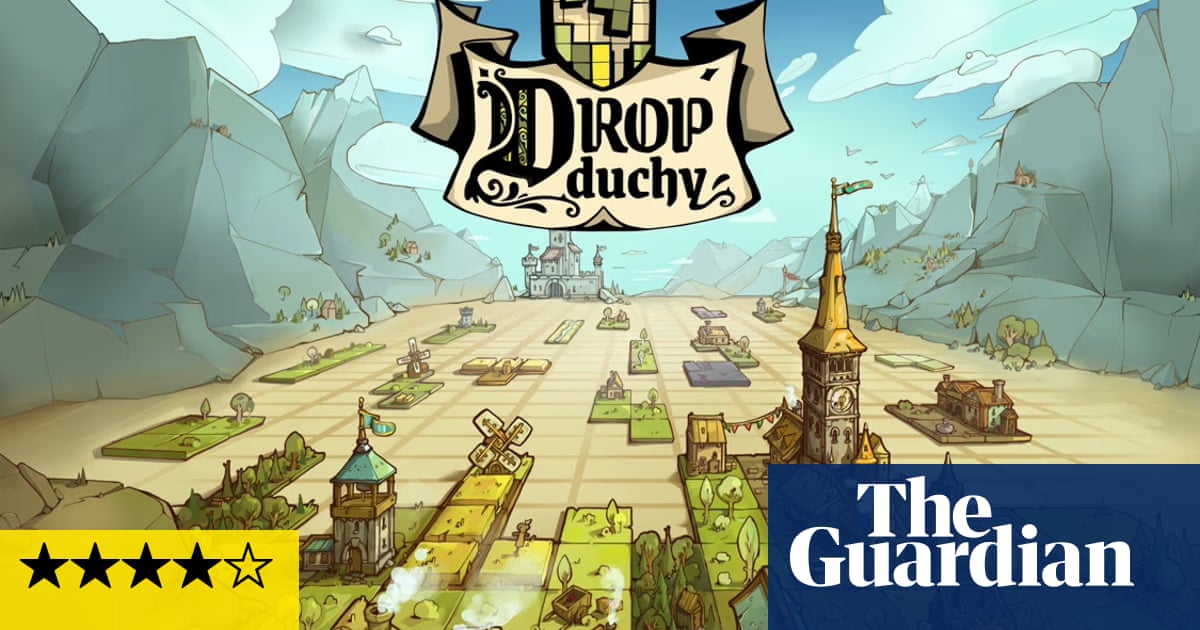The indie video game scene is currently dominated by two unassailable genre titans: the rogue-like and the deck-builder. The first is a type of action adventure in which players explore procedurally generated landscapes, where they battle enemies, level up and then die – whereupon they start all over again from scratch. The latter is about building decks of collectible cards (think Pokémon or Magic: The Gathering, but digital) and fighting with them. Titles that combine both in interesting ways – such asBalatroandSlay the Spire– can become huge crossover hits. But the market is getting saturated and so developers are having to find new genres to mix into this potent game design cocktail.
Hence Drop Duchy, a game that attempts to combine the rogue-like deck-builder with …Tetris. Yes, the action takes place on a playfield in which differently shaped objects drop from the top of the screen to the bottom – except here, each object is either a landscape-type or a building, and the player isn’t only trying to create unbroken lines, they’re trying to place these units effectively to generate resources. Place a farm near a grassy plain block, for example, and it will produce wheat. Put a wooden fortress near a forest and it will generate farmland and swordsmen. When you complete a line, it doesn’t disappear: instead, it multiplies the resources you’re gathering. Why do you need the aforementioned soldiers? Well, alongside placing your own military bases, you also have to find space for random enemy bases, too, and at the end of the round, when all the blocks have been placed, you enter a combat sequence in which you align your military units to take on your foe.
The deck-building part is perhaps the most ingenious. Each random block that gets dropped into the play area is based on a card you hold in your deck – and as you progress, you can add new cards to widen your tactical capabilities. You might start with a farm, a wood clearer (turns forests into agricultual land) and a watchtower (produces archers), but as you play through an act – a sequence of battles that culminate in a boss encounter – you unlock new cards, and can spend resources on upgrading them to be more powerful. The boss battle is a themed encounter with specific challenges. In act one, the boss is the Wall, an edifice that restricts the play area, forcing you to build in a tight space, while act two ends with the Keep, an almost impenetrable fortress that you have to concentrate your forces against.
It sounds complicated, and in some ways it is. But to the credit of the developer Sleepy Mill Studio, learning the basic rules and strategies is fairly intuitive, helped by a decent tutorial level and lots of onscreen hints and info. As with most rogue-lite games, there is a progression tree that allows you to unlock more powerful card types and mechanics that will stay with you through subsequent play-throughs. In this way, you can gradually crawl your way to easier victories through dozens of inevitable failures.
What’s really interesting about the game is the way it forces you to think about Tetris in a whole new way. You’re not just placing objects to clear lines and stay alive; you’ve also got to think about how each piece interacts with those around it, and also how best to place enemy pieces in order to starve them of resources. It’s essentially a sprawling, five-dimensional challenge, disguised as a simple block-dropping puzzler.
There are times when this ceaseless assault on your mental faculties can feel all too much. For the first few hours, you’ll be beaten senseless by the boss encounters, especially if you’re unlucky with your random card draws at the start of each battle – often, one misplaced block can turn a carefully planned battle map into a military blunder the size of Napoleon’s invasion of Russia.
And yet, the quaint pastel visuals, soothing music and ever-expanding range of resources, mechanics and abilities keep you playing. As with Balatro, there’s a sense that you only ever understand about 20% of what’s happening and that often you’re just throwing stuff out there and praying for a lucky break. That’s kind of fine, though, and as you stick with it, you learn more robust strategies for powering up your armies while limiting those of your enemy.
Sign up toPushing Buttons
Keza MacDonald's weekly look at the world of gaming
after newsletter promotion
Drop Duchy is an extremely clever experiment in game design by combination, and with each new feature you wonder how on earth the team managed to balance all the spinning plates. There’s a reason why the rogue-like and deck-builder genres are so wildly popular: they’re compulsive, challenging and systemically fascinating, and each one adds its own little foibles to the collective rulebook. In the case of Drop Duchy, the foibles are worth the price of entry alone.
Drop Duchy is available now, £12.99
